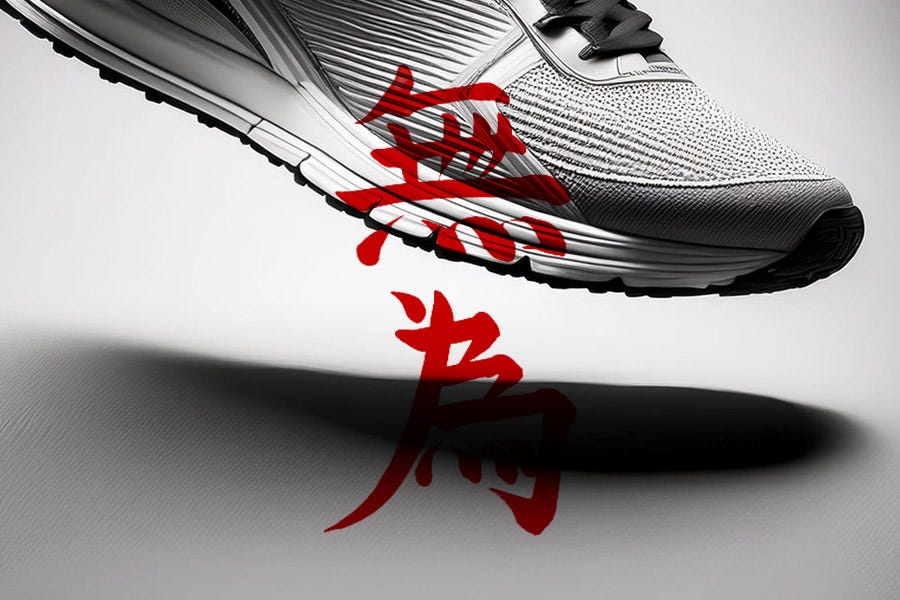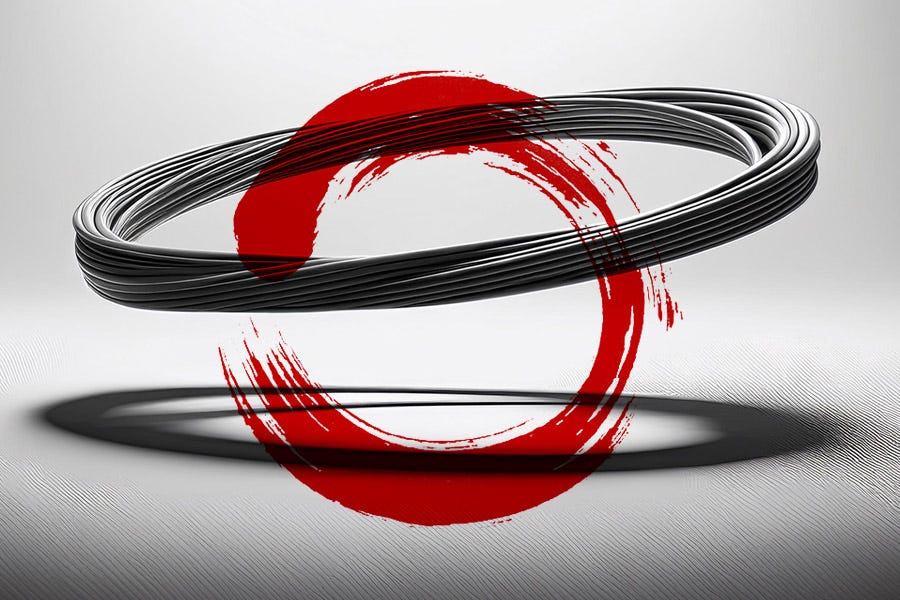Wu Wei Running
Experience better running by not trying.
There’s a run coach I sometimes spar with online. I know, I know, but it’s all very respectful and done in the interest of balanced discourse.
This coach will write a post that minimizes running to mere data points. And, because I wriggle when this thing I love is reduced to math, I’ll counter with a line about mind-body connection or some other ethereal aspect of our sport.
Recently, he posted about how some races feel hard and others feel easy, and why this is all about conditions and conditioning: weather, training, sleep, hydration, etc... Measurable stuff. Without thinking too much about it, I thumbed-out a counterpoint:
There might also be something here about ‘not-trying’ (or wu wei, if you like). Maybe there's a tension going into these bad races, or maybe tension develops as we start to feel things aren't going perfectly. The brain gets involved, we push, it gets harder.
Wu wei, often translated as "effortless action” is a Taoist concept that describes a synergy with nature. It’s a concept closely aligned with the Western term, “flow state,” as coined by psychologist Mihaly Csikszentmihalyi in the 1970s.
The Mysterious Tao: It is unseen because it is colorless; it is unheard because it is silent; if you try to grasp it, it will elude you, because it has no form.
Lao Tzu, Tao Te Ching
Both wu wei and flow are about letting actions unfold in an intuitive and relaxed way, rather than trying to control every detail or force outcomes. In both, the word “try” carries more weight than it might in casual conversation. Here, trying implies a kind of strain by the conscious mind to impose its will.
On the flip side, intentional “not trying” allows for effective action without unnecessary tension. Think of a river tracing its right path to the sea.
As you can imagine, applying the idea of steady, non-assertive, even subconscious action to running can be transformative. With less stress in the system and fewer intrusive thoughts, a person might expect lower perceived exertion, a greater sense of connection and enjoyment, and perhaps fewer tension-related injuries.
I did some thinking about my own effortless days in fifteen years of running (along with the ones that felt difficult from the jump). What were the common threads? Is there a way to build habits and mindsets into our running that makes achieving flow more likely?
Here, my friends, is a quick guide to creating a foundation for wu wei running, mapped to an easy-to-digest acronym.
EAT: Ease, Attunement, Trust.
E is for Ease
Wu wei isn’t no effort. It’s “no unnecessary effort.” Likewise, we’re not seeking no tension. In fact, some tension in muscles, tendons, ligaments, and fascia creates a powerful rubber band effect that propels us forward. No tension, no power.
Fascia works like a coiled spring, capturing and releasing energy with each stride, so that movement feels lighter, smoother, and more sustainable.
- Shane Benzie, The Lost Art of Running
Wu wei running is letting go of excess physical and mental tightness, allowing the mind to go quiet and the body to find its own right rhythm. Instead of straining to maintain a pace (because, like, time is a construct, maaan) or obsessively controlling form, you allow yourself to sink into a way of running that feels fluid.
When I’ve experienced flow in races—like this year’s Missoula Half Marathon—on foot-strike I can sense my calf muscles, I don’t know… jiggling. My face is relaxed, feet lively, hands unclenched (buttcheeks, same). Cadence is quick, ground contact light.
In this state, I’ll often glance at my watch and find I’m running faster than planned.
In Practice
To cultivate ease, start slow. When racing, get in a nice warmup to calm the nervous system and wake up your body. Notice any urge to start pushing, and patiently park it somewhere else in the brain. Check in with your body (face, feet, hands, buttcheeks) and release unnecessary tension. Allow the day to come to you, and believe that it will.
I have found that I improve more when I let the training come out, and am not trying to force something special to happen. It’s interesting that I maximize my potential when I just let it come out rather than by trying harder.
- Ryan Hall (fastest ever American marathoner)
A is for Attunement
Attunement is about being connected to the present moment through awareness of our bodies, emotions, and the environment around us. Running with wu wei simply means noticing rather than controlling the subtle shifts and changes in each.
Being a person of the Tao means being attuned to cycles of change and transformation.
- Elizabeth Redinger, Taoism for Beginners
In Practice
Physiology gives us two words for presence manifested in the body: proprioception and interoception. The former is the sense of our physical body and limbs in space. The latter is awareness of sensations like heartbeat and breath, and emotions like anxiety and joy.
By noticing both proprioceptive and interoceptive feedback, we’re able to make subtle adjustments. But mostly, we just want to notice and let go, as if the feedback is a mathematical data point (see what I did there?) that flashes briefly then fades away. To run with wu wei, we’re not judging or problem solving, we’re observing.
Noticing our environment can also be a strong anchor to the present. In the opening miles of Missoula, I was taken by the sunrise reflected in the Clark Fork River. Later, the smiling faces of spectators and volunteers became focal points. Tuning in to the scenes passing by kept my brain from running down the road, to a future I could neither predict, nor control.
T is for Trust
Wu wei running means letting go of control, and letting go requires trust in your abilities and instincts. Rather than micromanaging the run, you place faith in your training, preparation, and your body’s intuitive sense of movement. This trust enables you to run more freely, removing the mental barriers of doubt or overthinking.
In short, as you let go, your body naturally performs at its best.
To consistently choose the right feeling to trust, you must … observe yourself from a perspective based on accumulated wisdom. You must cultivate mindfulness.
- Matt Fitzgerald, The Mind-Body Method of Running By Feel
In Practice
There’s another word for self-trust: confidence. It won’t surprise you that wu wei-style confidence is not the brash, chest thumping variety. It’s quiet and internal—the result of “accumulated wisdom” gained over the course of a running career.
Confidence is not some nonphysical quality snatched from the spiritual dimension and installed in the mind. It is the feeling that arises when the body’s knowledge of itself is in harmony with a person’s dreams.
- Matt Fitzgerald
To cultivate this kind of confidence, runners might construct training in a way that directly addresses their goals. For example, if you want to run a marathon at 9:00 pace, progressively build in training the time you can spend at 9:00. The “physical confidence” gained will generate mental confidence, which you’ll be able to access when needed through easy, present moment-attuned “not trying.”
The Finish Line
Wu wei running isn’t “no effort.” It’s a different kind of effort, one that naturally delivers just what’s needed without our ego pushing for control. When we cultivate ease, attunement, and trust, running transforms from a task to an experience of flow—effortless movement guided by intuition.
Next time you lace up, consider letting go of the need to manage every detail. Check in with the buttcheeks, unclench*, and trust the body to find its right path.
Turn off your mind, relax and float downstream.
- John Lennon, Tomorrow Never Knows
Run lightly,
-mike
*Talking to myself, obviously.
Thank you for being here. Please consider upgrading your subscription to support my work.





Wowee wow. So much good stuff in here, but especially this:
When we cultivate ease, attunement, and trust, (insert anything) transforms from a task to an experience of flow—effortless movement guided by intuition.
Oh, and who'da thunk buttcheeks was just one word?
The quote from John Lennon hits the nail in the head.